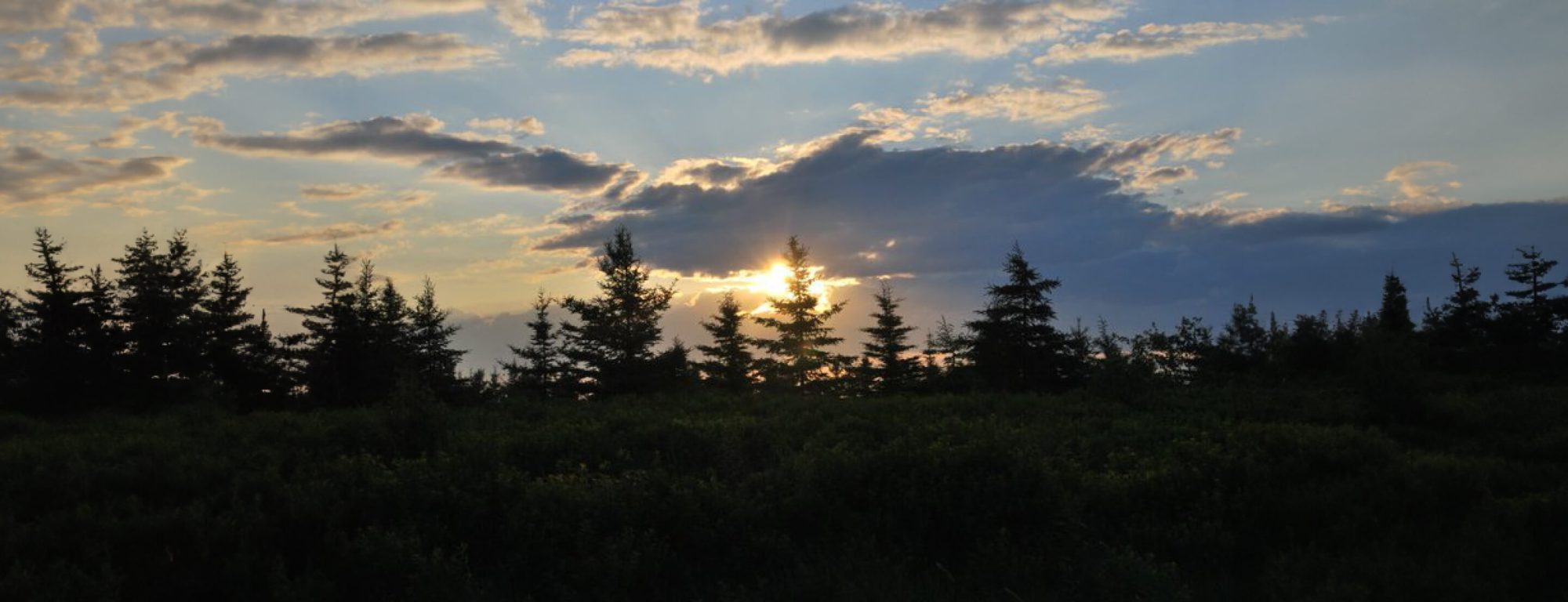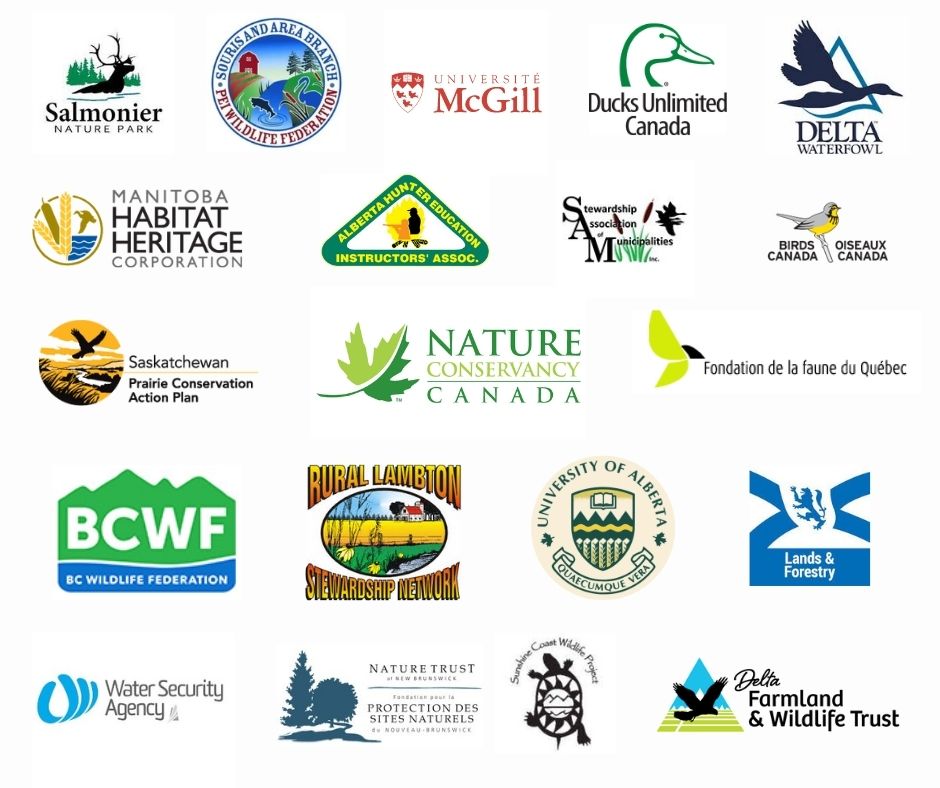“Wildlife Habitat Canada has been providing grant funding through the Habitat Conservation Stamp Initiative Grant program for over 35 years,” said Cameron Mack, Executive Director of Wildlife Habitat Canada. “Our grantees are true leaders in conservation work and we look forward to supporting their efforts to promote conservation education and complete valuable on-the-ground restoration work on valuable habitats.”
Wildlife Habitat Canada’s (WHC) Habitat Conservation Stamp Initiative is a grant program that works to put WHC goals and priorities into action. The program works to provide funds for conservation projects across the country through the sale of the Canadian Conservation Stamp. The initiative is rooted in WHC’s goal of making wise investment decisions to support habitat conservation and the priorities of the North American Waterfowl Management Plan (NAWMP).
The NAWMP is comprised of 3 goals, updated in 2012. The first is to increase and maintain waterfowl populations, the second to conserve vital wetland habitat to foster waterfowl species vitality, and the last is to grow the number of hunters, conservationists and citizens engaged in habitat conservation in Canada. WHC invests in projects that support these priorities, divided into three main grant categories – Habitat Conservation, Conservation Networking and Research Projects. WHC would like to thank and congratulate the 2021-2022 grant recipients as we look forward to working together in conservation to support priority species and their vital habitats!
Habitat Conservation Projects: With a focus on habitat conservation, restoration and enhancement, this branch of the program supports the first goal of the NAWMP. In collaboration with WHC, the following organizations are working to put these goals into action.
- Nature Conservancy Canada, with aid from WHC funding, is working on a restoration project to increase the function of vital priority habitat as identified by their associated Habitat Joint Venture. They are working to restore important coastal habitats and estuarine marshes while improving public awareness of conservation in Québec.
- Fondation de la faune du Quebec, through their 2021-2022 project, are aiming to create stewardship connections with landowners to support and enhance their wetlands to provide for significant waterfowl species. This will include the restoration of existing wetlands, the creation of new ones and the education of landowners.
- Water Security Agency, in partnership with WHC, are working to support waterfowl breeding populations in Saskatchewan by converting cropland to bird-specific forage. This project will also involve conducting a survey of hunters to gain an understanding of hunter contribution to habitat conservation and waterfowl population consideration.
- Manitoba Habitat Heritage Corporation, under the Prairie Habitat Joint Venture, is working with WHC to permanently protect 390 acres of wetland habitat in an attempt to foster waterfowl breeding. An additional 1,660 acres will be enhanced through the installment of Hen House nesting structures for a total of 2,050 acres positively impacted through the work of this project.
- Delta Waterfowl, with their regional prairie project, are working to preserve the “duck carrying capacity” of important breeding lands across western Canada. With the help of WHC funds, Delta Waterfowl will be installing 3,400 Hen House structures across Alberta, Saskatchewan, Manitoba and Ontario.
- Delta Farmland and Wildlife Trust is aiming to implement forage crops in British Columbia to support the waterfowl population that resides there during the summer months. This will be accomplished by planting cover crops that will act as a food source, as well as through a surveyal of the use of agricultural land by waterfowl to better understand the population.
- Nova Scotia Department of Lands and Forestry has a project in progress that is focusing on conducting approximately 40 WESP (Wetland Ecosystem Services Protocol) assessments to evaluate the functionality of wetlands in Nova Scotia. This will act as a guide to managing wetlands based on their benefits and climate change mitigation potential.
- Rural Lambton Stewardship Network, with the financial contribution of WHC, is working on the removal of invasive species across 30 acres in Ontario. This restorative work is beneficial not only for ecosystem health, but for human and non-human species who reside in the area.
Conservation Networking Projects: Supporting the second goal of the NAWMP is the Conservation Networking grant category. As recipients of these funds, the following organizations are working in partnership with WHC to extend the reach of conservation education and awareness.
- British Columbia Wildlife Federation is actively working on two projects in the 2021-2022 year, both rooted in education and awareness about the conservation of wetlands. Their Youth Day Camps aims to reconnect youth to nature by engaging participants in outdoor activities and community building excursions. Similarly, the Wetlands on Wheels project involves the education of community members and landowners about the importance of wetlands, the role of waterfowl and training in conservation and restoration of these priority habitats.
- Delta Waterfowl, in line with the NAWMP goal to grow the number of Canadian hunters, has initiated a project in which hunter training and education course will be offered to new hunters, youth, women and new Canadians. This will include a number of mentored hunts, virtual education experiences and volunteer opportunities.
- Souris and Area Branch of the PEI Wildlife Federation, with the funding received from the Habitat Conservation Stamp Initiative, is planning a series of free wildlife camps focusing on waterfowl education, conservation and hunter recruitment, as well as angling and trapping. These camps will be organized and executed in collaboration with other local groups and clubs to include as many participants as possible in conservation education.
- Birds Canada, also working under the NAWMP goal of increasing the number of conservationists in Canada, is operating a project focused on developing a Breeding Bird Atlas, based out of Newfoundland and Labrador. Their goal is to collect baseline information about waterfowl populations in the area through the involvement of volunteer “Citizen Scientists” that can provide first-hand information on local environments.
- Alberta Hunter Education Instructor’s Association, with funding from WHC’s Habitat Conservation Stamp Grant, is continuing its work to offer valuable educational experiences to novice hunters in Alberta. Their work involves hunter education courses, firearms safety courses, waterfowl identification training and many more opportunities for those interested in hunting and conservation.
- Friends of Salmonier Nature Park has developed a project that provides opportunities specifically for women to engage with nature and learn new outdoor skills. Through their Becoming and Outdoors Woman (BOW) program, women are given the chance to participate in mentored hunts, shooting and archery courses, and cooking wild game workshops – contributing to the NAWMP goal of increasing conservationists and hunters across the country.
Research Projects: The Research grant category of the Habitat Conservation Stamp Initiative encompasses all of the goals of the NAWMP as it strives to develop the most efficient conservation methods, technologies and population tracking systems. There are three research-based organizations partnered with WHC for the 2021-2022 year.
- University of Alberta is working in collaboration with WHC and 4 Canadian Joint Ventures to evaluate the hunting and recreational conservation activity rates on a national scale in order to inform the new priorities of the involved Joint Ventures. The results from this web-based survey will allow the Joint Ventures to create new, specific targets that work to support the NAWMP goal of growing the number of hunters and conservationists in Canada.
- Ducks Unlimited Canada, in collaboration with the University of New Brunswick and WHC, is executing a project this year that will investigate the benefits, reliance and usage of nest boxes along the lower St. John’s River. By establishing an understanding of waterfowl use of these nesting structures, DUC can then better evaluate where new nest boxes are needed for specific species and move forward with constructing and installing those.
- McGill University, who operates specifically under WHC’s Newfoundland and Labrador Murre Conservation Grant, is continuing their research into the movement and location of Thick-billed Murres. This will be executed through the use of GPS loggers and geolocators to better understand the placement of the birds throughout the winter months and the distribution of the population across Canada.


